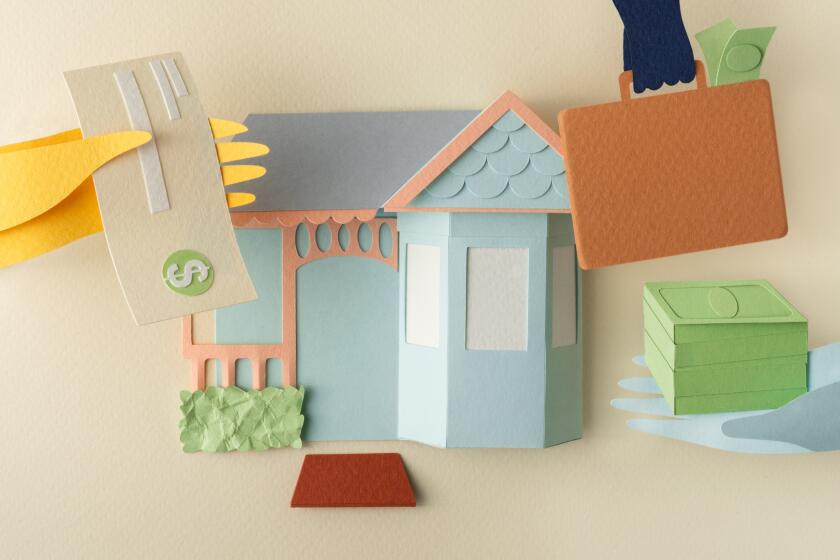
- Share via
Your agent calls with some fabulous news: The seller accepted your offer.
Although you just cleared a major hurdle in today’s cutthroat market, you’re not done. You still have to close the deal, which means going through one of the most confusing and nerve-racking processes in the home-buying experience:
Escrow.
In an overview of the process, the California Department of Real Estate said it can be unpredictable and stressful and that buyers can’t “fully understand and appreciate how escrow works” until they’ve personally gone through one.
Lindsay Weitzel, who purchased a $615,000 house in Watts last year, put it in less antiseptic terms.
“It’s terrifying,” the 43-year-old high school teacher said. “It’s like a new emergency every day.”
Five homebuyers tell us how they chose which neighborhood to commit to in Greater Los Angeles — no small feat.
So buckle up! Here’s some guidance to help you go through escrow less mystified and at least slightly less stressed.
Escrow exists because you and the seller have to clear a few hurdles before the sale can be completed. An independent third party, usually called an escrow agent or escrow holder, will collect your money, then release it to the seller when all conditions of your purchase contract are met.
After all, you and your lender don’t want to fork over hundreds of thousands of dollars and then simply trust the seller to hand over the house to you. Right?
One of the first steps is sending a portion of your down payment to the escrow agent to hold. This is called your “earnest money” deposit, giving you a powerful incentive to hold up your end of the bargain. If you walk away in the middle of escrow for no good reason, the seller has a right to keep that money.
There isn’t a required amount of earnest money, but in today’s market many buyers agree to put down 3% of their purchase price. In theory, you could write into your offer that you won’t put any earnest money down, but a seller would probably choose someone else.
What could possibly go wrong?
After paying your earnest money, there are a handful of steps left in escrow.
Uncommon ways to buy a home
You don’t have to do them in any particular order, said PJ Garcia, president of the Escrow Institute of California, but you have to complete them all in the time frame you agreed to in your purchase contract.
These steps include the contingencies written into the contract to protect against unforeseen circumstances. You should have had a detailed discussion about them with your real estate agent before making your offer.
Contingencies are like escape hatches — they can provide legitimate grounds for you to walk away from the sale without losing your earnest money.
An earlier chapter in this series laid out the main contingencies. Assuming you didn’t waive them in your contract offer here’s how they will play out during escrow.
The appraisal contingency. Your lender won’t let you borrow more than the home is worth, so it will order an appraisal. The result will reflect what similar homes in that neighborhood sold for recently.
If the appraisal comes in lower than the amount you offered, you will have the right to back out. You can also try to persuade the seller to accept less for the home, or you can put up more of your own money to make up the difference.
The inspection contingency. A close inspection of the home will reveal many things you missed at the open house — including problems unknown to the seller. If an inspector finds something that you don’t like, such as a cracked foundation or hidden problems in the pipes and roof, this contingency allows you to walk away.
“Buyer interest” letters are common in ultra-competitive housing markets like California’s, even though they raise questions of discrimination.
The loan contingency. Maybe you switched to a lender that hadn’t preapproved you. Or maybe you couldn’t document your income or even lost your job. If the sale craters because the loan you were counting on isn’t approved in time, this contingency allows you to keep your earnest money.
In each contingency, there is a set time frame — maybe seven days for one, 17 days for another — to accomplish what you need to accomplish. Before the end of each time frame, you and your real estate agent must tell the seller’s agent whether you are using that specific contingency to back out. If you run out of contingencies and still can’t or don’t want to close, you may lose your earnest money deposit.
The Great SoCal House Hunt
Given these deadlines, the Consumer Financial Protection Bureau recommends ordering a home inspection as soon as possible after getting your offer accepted. That way, if issues arise you have time to resolve them short of canceling the deal. For example, you can negotiate your purchase price down or ask the seller to pay for repairs.
When ordering a home inspection, the CFPB says, you should pay for it yourself at the time of inspection. Don’t let the seller pay for it or wait to pay the inspector at the close of the loan. This way you can be more assured the inspector is looking out for your interest and has no financial incentive to gloss over any problems.
Your real estate agent will probably recommend an inspector to hire, but you should do your own research as well, the bureau cautions. Scrutinize online reviews and ask family and friends for recommendations.
In California, inspectors aren’t required to have a specific home inspector license, but they can get certified through the California Real Estate Inspection Assn., which sets standards and provides a list of those who’ve met them.
Michele Blair, the group’s executive director, suggested a few questions to ask prospective inspectors: How long have they been inspecting, are they familiar with the neighborhood you are buying in, and are they insured.
Finding an inspector could be difficult, however, if you shortened your contingency period to make your offer stand out.
A simple checklist for open houses to make sure you don’t miss a thing in your search for a new home.
Weitzel, the buyer in Watts, said the inspector her friend recommended wasn’t available within the 10 days she had, so she went with one recommended by her real estate agent.
“That dude, I think, was not as thorough,” she said. So far, she’s had to pay $22,000 to fix the roof after her insurance company said it would cancel her insurance unless she did so.
“To be fair, he did say that I would have to replace my roof eventually, but it wasn’t like, ‘You are not going to [be able to] insure this house,’” she said.
Finalizing your mortgage
Another major — if not the most significant — escrow step is getting formal approval for your loan.
After getting your offer accepted, you should shop around again for the best estimates from different lenders if you have the time, said Andrew Pizor, a staff attorney with the National Consumer Law Center. But be aware of the clock! Multiple real estate agents warn that the typical escrow period is too short for last-minute comparison shopping; they urge borrowers to do the work ahead of time and stick with the lender they liked best.
Assuming you don’t look around for a better offer, you should contact your lender or mortgage broker in writing when you open escrow and ask them for everything they will need from you to close the loan, said Jeff Lazerson, president of the Mortgage Grader, a broker in Laguna Niguel.
If you haven’t been preapproved, you’ll need to submit your financial information at this point. This includes bank statements, W-2s or 1099s, and documentation of stock holdings, retirement funds and other assets. You’ll also need to submit a copy of your driver’s license.
If you recently received preapproval, you may not have to resubmit much documentation. But if you’ve spent a month or more since your preapproval bidding on multiple homes, be prepared to resubmit some, or all, of your financial documents.
When going through this, experts said, it’s important to be available to your lender or mortgage broker and to promptly answer requests for documents.
“If we get stuff piecemeal from a borrower, it can be long and painful,” Lazerson said. “If a borrower is on top of their game ... we can get this stuff buttoned up in hours.”
If everything checks out, the lender will give you full approval for the loan. Typically the only way the loan doesn’t close after being approved is if the buyer gets laid off before closing on the house or something “way outside the box” happens, such as the death of one of the borrowers, Lazerson said.
As you work toward that final approval, the CFPB says to be aware of any revisions to your loan estimate, the standard form lenders use to detail what the loan will cost. You should have received one after you provided the lender with the address of the home you were buying.
The loan estimate may legitimately change only if “new or different information is discovered,” the CFPB says — for example, you sought different loan terms or your appraisal came in low. So be sure to ask why any prices changed.
Closing costs
It’s helpful to discuss the remaining escrow steps in the context of closing costs, which are the fees you pay in addition to your down payment to close a loan. These include payments for the appraisal and home inspection and prepayments for property taxes, interest and lender-required homeowner insurance.
Some of these items you can shop around for; others, the lender handles and charges you a fee. What you can shop around for varies by lender and is listed in Section C on page 2 of your loan estimate.
Another thing you must decide before closing is how to hold title to the property (that is, how to structure your ownership). Several options are detailed in the box below. Talk to a real estate lawyer about what is best for you because there are tax and inheritance considerations, Garcia said, and aim to do so before opening escrow.
The escrow period is a busy time. There’s lots of paperwork to sign and submit to your agent, lender and escrow officer. Make sure you talk to them to understand what they need from you and when.
In Southern California, much of this paperwork is done throughout the escrow process, whereas in Northern California it’s more likely to be done all at once toward the end, Garcia said.
Regardless of the timeline, it’s important to read all the documents and ask any questions that arise. Let everyone — the lender, escrow agent and your agent — know if you will be out of town because there are documents you must sign in person.
If you are married, lenders typically require that your spouse be present to sign some documents, even if you are the only person taking out the loan, Garcia said.
The finish line
If you’ve completed all the necessary steps, including getting the full loan approval, removing contingencies and purchasing homeowner insurance, you can move to closing the loan.
The lender must send you a “closing disclosure” form three business days before the loan closing date that details your final costs, including closing costs. Again, watch out for changes from your loan estimate and remember to ask why they have occurred.
Congratulations! But watch out for these hidden costs
Many people underestimate the cost of the home-buying process and owning a home beyond the mortgage. Closing costs are a big one.
Garcia said buyers in California typically sign the final loan documents at an escrow agent’s office one to three days before the deal actually closes. Some escrow companies will send a mobile notary so you can sign at your house, but Garcia recommended against it, saying it was better to go through the documents in a professional setting with no distractions.
After you sign the final loan documents, Garcia said, all parties — lender, escrow company, buyer and seller — typically review them to see if anything is missing. If all is in order, Garcia said, the buyer will wire the remaining down payment and the escrow officer will close the deal by telling the title company to record the deed.
Once that happens, you are a homeowner.
Step-by-Step Guide
More to Read
Inside the business of entertainment
The Wide Shot brings you news, analysis and insights on everything from streaming wars to production — and what it all means for the future.
You may occasionally receive promotional content from the Los Angeles Times.























